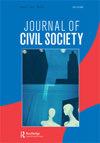Undermining, defending or expanding EU citizenship? CSOs’ positions on providing humanitarian assistance to EU citizens with limited rights to public welfare services in Norway
IF 0.9
Q3 POLITICAL SCIENCE
引用次数: 0
Abstract
ABSTRACT This article explores the positions of Civil Society Organizations (CSOs) on providing humanitarian assistance to European Union (EU) citizens with limited rights to public welfare services in Norway through 19 interviews with leaders of humanitarian services run by CSOs in Oslo. The article shows a contradictory picture. On one side, leaders expressed awareness and concern regarding risks associated with the provision of humanitarian services in a country with a comprehensive and ambitious welfare state. These include creating parallel welfare services based on charity rather than rights, and that such services may hide structural violence, or give it a humane façade, thus potentially contributing to the legitimacy and preservation of exclusionary welfare policies and practices. On the other side, service leaders were sceptical towards granting all EU citizens equal access to public welfare benefits and services and reported advocating for the expansion of humanitarian services rather than inclusionary rights for all EU citizens in Norway. We suggest that this may indicate an acceptance of the EU’s principle of conditionality of welfare support on employment history, and a limited willingness or capacity of CSOs to engage in advocacy that could contribute to alternative narratives about EU citizenship and challenge structural exclusion.削弱、捍卫或扩大欧盟公民身份?民间社会组织对向在挪威享有有限公共福利服务权利的欧盟公民提供人道主义援助的立场
摘要本文通过对奥斯陆民间社会组织人道主义服务负责人的19次采访,探讨了民间社会组织在向挪威享有有限公共福利服务权利的欧盟公民提供人道主义援助方面的立场。这篇文章展示了一幅矛盾的画面。一方面,各国领导人对在一个拥有全面和雄心勃勃的福利国家提供人道主义服务的风险表示认识和关切。其中包括建立基于慈善而非权利的平行福利服务,这些服务可能会掩盖结构性暴力,或为其提供人道的外表,从而可能有助于排斥性福利政策和做法的合法性和维护。另一方面,服务业领导人对让所有欧盟公民平等获得公共福利和服务持怀疑态度,并报告称,他们主张扩大人道主义服务,而不是让所有在挪威的欧盟公民享有包容性权利。我们认为,这可能表明接受了欧盟对就业史福利支持的附加条件原则,民间社会组织参与宣传的意愿或能力有限,这可能有助于对欧盟公民身份的替代叙事,并挑战结构性排斥。
本文章由计算机程序翻译,如有差异,请以英文原文为准。
求助全文
约1分钟内获得全文
求助全文

 求助内容:
求助内容: 应助结果提醒方式:
应助结果提醒方式:


